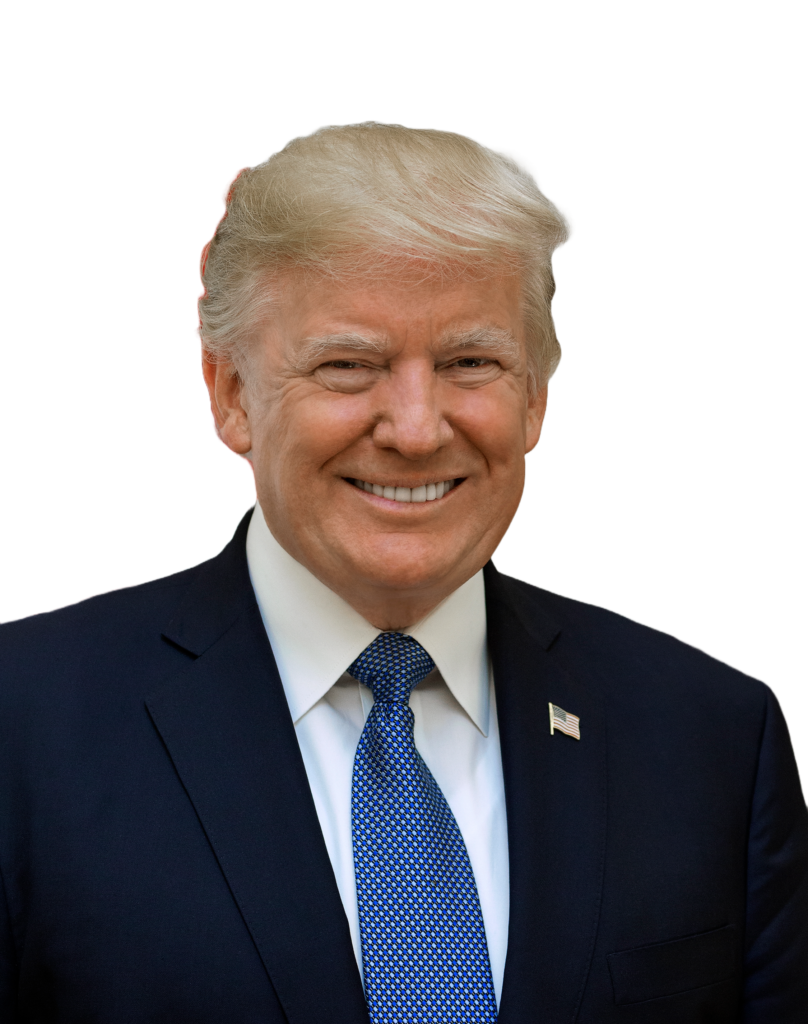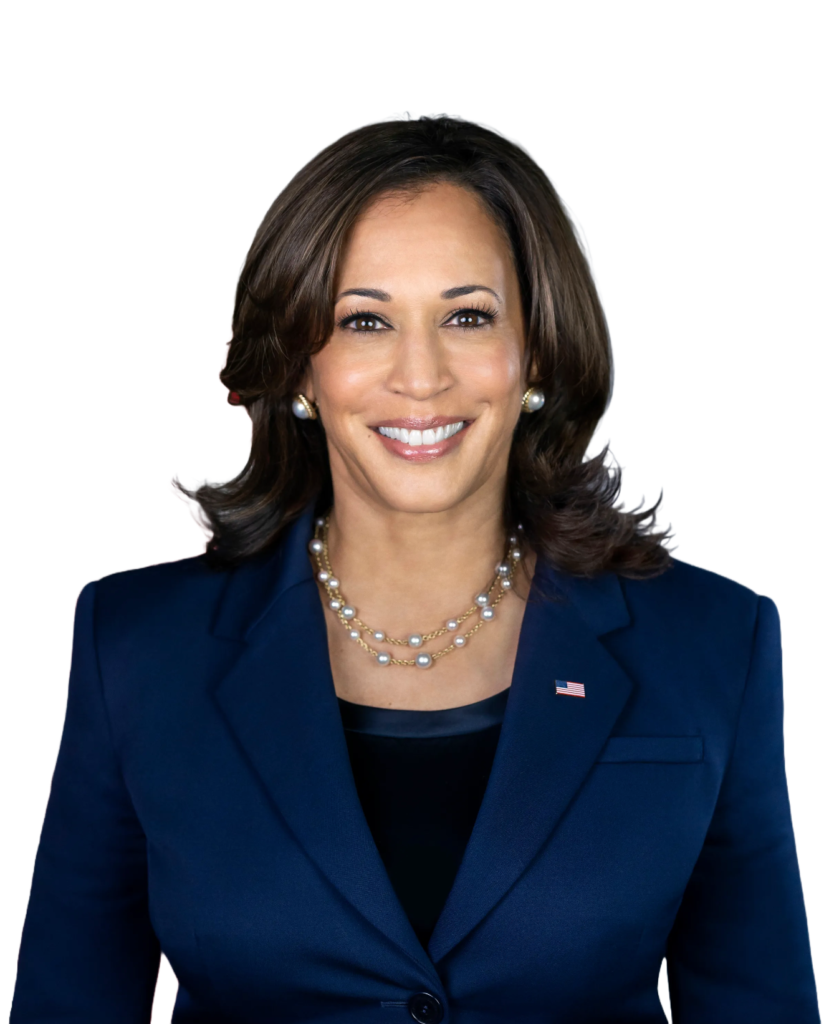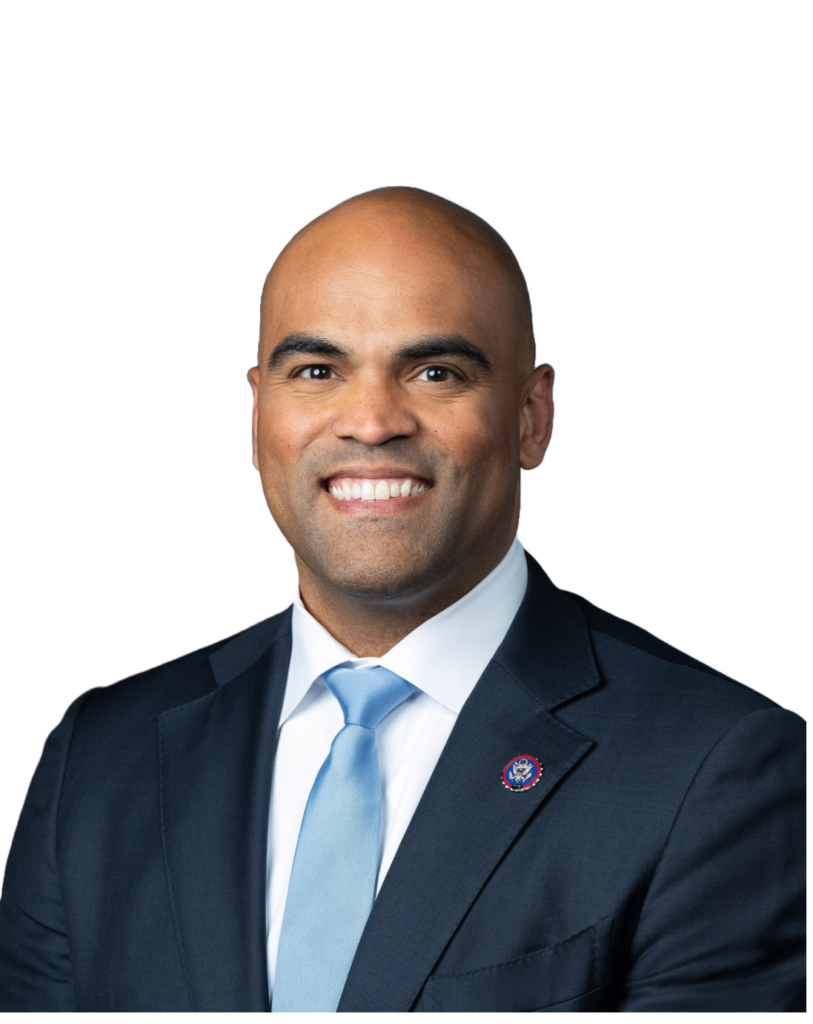

Get to know who you are voting for!

United States President
Donald Trump served as the 45th President of the United States from January 2017 to January 2021, implementing policies that directly impacted the economy, trade, and national security. His administration’s actions led to measurable changes in America’s global standing, economic performance, and regulatory environment.
Donald J. Trump was born on June 14, 1946, in Queens, New York City, to Fred and Mary Anne MacLeod Trump. As the fourth of five children, Trump grew up in a household rooted in Scottish and German ancestry. His father, Fred Trump, was a successful real estate developer and builder, which introduced Donald to the real estate industry at a young age.
Education and Formative Years: Trump attended the Kew-Forest School in Forest Hills, Queens, before his parents enrolled him in the New York Military Academy (NYMA) at the age of 13. At NYMA, he participated in extracurricular activities and graduated in 1964. He then attended Fordham University for two years and transferred to the Wharton School at the University of Pennsylvania, where he graduated in 1968 with a Bachelor of Science degree in economics, focusing on finance.
After earning a degree in economics from the Wharton School at the University of Pennsylvania, Trump joined the family business and gradually began to leave his own mark on it. He shifted the company’s focus from the boroughs to Manhattan, transforming Elizabeth Trump & Son into The Trump Organization. Here, he undertook ambitious projects that included high-end residential and commercial properties, making a significant name for himself in real estate.
Under his administration, the Dow Jones Industrial Average reached unprecedented heights, surpassing 30,000 points for the first time in U.S. history. This milestone marked a significant moment in the history of the American stock market.
Median family income saw an increase of nearly $6,000, which was more than five times the gains during the previous administration.
Ramped-up domestic production of oil and natural gas, making the U.S. a net exporter of energy for the first time in 70 years.
Implemented stringent immigration controls that drastically reduced illegal crossings and strengthened national security.
Signed legislation allowing terminally ill patients to access experimental treatments not yet approved by the FDA.
Implemented the Phase One trade deal with China, which included a commitment by China to increase purchases of American products and services by at least $200 billion over two years.
Brokered the Abraham Accords, leading to normalization agreements between Israel and several Arab nations, enhancing peace prospects in the region.
Enforced stringent immigration policies, significantly reducing illegal border crossings.

United States President
Vice President Kamala Harris serves as the first woman, the first Black American, and the first South Asian American to hold the office. Her career in public service is marked by her roles in local, state, and federal government, where she has focused on a broad array of issues from social justice to economic policy.
Kamala Harris was born in Oakland, California. Her mother, a scientist from India, and her father, an economist from Jamaica, influenced her early life. Harris attended Howard University, where she earned a Bachelor of Arts in Political Science and Economics, and later, she received a Juris Doctor from the University of California, Hastings College of Law.
My mother would look at me and she’d say, ‘Kamala, you may be the first to do many things, but make sure you are not the last.
- Kamala Haris
Vice President Harris is focused on creating policies that aim to strengthen the middle class and ensure that American economic and social systems are inclusive and equitable.
Advocated for policies intended to reduce taxes for middle-class families while addressing healthcare and housing costs.
Supported legislative efforts aimed at addressing climate change and promoting sustainable energy practices.
Supported reproductive rights and efforts to achieve gender equality in the workplace.
Supported reforms to the criminal justice system, focusing on reducing recidivism and modifying sentencing laws.
Supported initiatives to protect and enhance voting rights and election security.
Advocated for reforms providing a pathway to citizenship for undocumented immigrants, with a focus on protections for Dreamers.
Endorsed measures aimed at expanding healthcare access and reducing costs, including efforts to cap insulin prices.
Engaged in diplomatic efforts aimed at strengthening international alliances and global cooperation on issues such as security and trade.

United States Senator from Texas
Senator Ted Cruz of Texas has served in the U.S. Senate since 2013, advocating for economic freedom, strong national defense, and adherence to constitutional principles. Recognized for his legal acumen and conservative stance, Cruz has focused on policies that promote growth, security, and the liberties of American citizens.
Ted Cruz was raised in Houston, Texas, after moving there in 1974. He is the son of Eleanor Elizabeth Wilson, a computer programmer from Delaware, and Rafael Bienvenido Cruz, a Cuban immigrant who fled to the United States after being imprisoned and tortured by the Batista regime. From an early age, Cruz was surrounded by stories of struggle and the value of freedom, which deeply influenced his political and ethical beliefs.
In Houston, Cruz attended Faith West Academy in Katy, Texas, and later graduated from Second Baptist High School as valedictorian. He pursued higher education at Princeton University, where he graduated cum laude in 1992 with a Bachelor of Arts in Public Policy. Cruz then attended Harvard Law School, where he graduated magna cum laude in 1995 with a Juris Doctor degree.
Cruz became the first Hispanic to clerk for a Chief Justice of the United States. Prior to entering the Senate, Cruz served as the Solicitor General of Texas from 2003 to 2008, arguing before the Supreme Court in several high-profile cases.
Senator Ted Cruz has actively engaged in legislative efforts that advance and protect women’s rights. Through several significant bills, he has focused on enhancing the safety, health, and autonomy of women:
According to data from the Cyber Civil Rights Initiative, approximately 90% of the victims of nonconsensual pornography are women.
The ‘Take it Down’ Act is a significant legislative initiative focused on addressing and combating the issue of nonconsensual intimate visual depictions. This bill specifically targets the unauthorized sharing and publication of intimate images and videos, including those altered through digital means such as deepfakes, which can be used to create realistic yet entirely fabricated visual content.
This legislation, co-sponsored by Senator Cruz, mandates the removal of nonconsensual intimate visual depictions from platforms. It targets digital abuse, which disproportionately impacts women, thereby addressing a critical area of women’s rights in the digital era.
Senator Cruz co-sponsored the bill: “Allowing Greater Access to Safe and Effective Contraception Act,” aims to increase access to oral contraceptive drugs by promoting their over-the-counter availability.
This legislation advocates for Medicaid coverage of in vitro fertilization (IVF) services, supporting women who face fertility challenges and wish to start families.
This bill, sponsored by Senator Cruz, proposes that cash tips received by employees would not be subject to federal income tax. This would directly benefit service industry workers, and all individual taxpayers who rely heavily on tips for their income. By reducing the tax burden on these tips, the bill aims to increase the take-home pay of these workers.
This legislation proposes an increase in the special pension provided to Medal of Honor recipients, acknowledging their extraordinary sacrifices.
This bill seeks to ensure that veterans continue to see their current doctors and health care providers under the program if it’s in their best medical interest, thus improving the overall healthcare outcomes for veterans.
This bill ensures that all veterans have access to state veterans’ cemeteries, ensuring their rights to burial benefits are preserved irrespective of their state of residence.
As part of his support for the Tax Cuts and Jobs Act of 2017, Cruz contributed to a major legislative victory that resulted in significant tax cuts for individuals and businesses. This act aimed to stimulate economic growth.
Cruz played a significant role in securing federal aid for Texas after Hurricane Harvey in 2017. He supported emergency funding and relief efforts, which were crucial in helping Texans recover from one of the most devastating natural disasters in the state’s history.
Cruz has consistently advocated for stringent border security measures. He has been involved in legislative proposals aimed at increasing border security infrastructure, such as building a border wall, and has supported measures to end certain immigration programs he views as flawed.
Cruz has supported and helped pass legislation aimed at combating human trafficking, enhancing penalties for traffickers, and providing more resources for the victims.
This legislation, co-sponsored by Senator Cruz, criminalizes the nonconsensual publication sharing and exploitation of intimate images, which disproportionately impacts women. This law will protect individuals from sexual exploitation and harassment.
No tax on cash tips. The intent is to ensure that workers who rely on cash tips, can keep more of their earned tips without the deduction of federal income taxes.
Cruz has advocated for school choice initiatives, proposing legislation that aims to give parents more options for their children’s education, which is a significant issue in Texas where educational needs vary widely across the state.
Cruz has backed various initiatives to benefit veterans, a significant community in Texas, including efforts to improve healthcare services and expand opportunities for veterans transitioning to civilian life.

United States Senator from Texas
Colin Allred is a Congressman representing Texas’s 32nd congressional district, having grown up in North Dallas. Raised by a single mother who worked as a public school teacher, Allred’s early experiences in a community-focused environment influenced his career choices leading to public service.
Colin Allred was born and raised in North Dallas, Texas. He grew up in a single-parent household, where his mother, a public school teacher, raised him. His early life in a community with strong educational values and a supportive environment contributed to his later pursuits in education and public service.
Allred attended Hillcrest High School in Dallas where he served as class president. He later earned a full scholarship to Baylor University, graduating with a B.A. in history. Allred furthered his education at UC Berkeley School of Law, earning a Juris Doctor degree.
I will continue to stand up for the right to choose and against Washington Republicans’ radical anti-freedom agenda.
- Colin Allred
Allred was elected to Congress in November 2018. He has served as co-president of the Democratic freshmen of the 116th Congress. His legislative focus includes healthcare, social security, economic development, and infrastructure.
Allred co-sponsored the Bipartisan Safer Communities Act and sponsored the John R. Lewis Voting Rights Advancement Act of 2023.
Led the initiative to open the Garland VA Medical Center and supported the construction of a new VA clinic in El Paso and a Spinal Cord Injury Center in Dallas.
Secured over $241 million in earmarks largely for infrastructure projects at Dallas Fort Worth International Airport.
Voted for the impeachment of President Donald Trump in December 2019 and January 2021.
Foreign Affairs; Transportation and Infrastructure; Veterans’ Affairs.
Congressional Black Caucus, New Democrat Coalition, Bipartisan Paid Leave Working Group, Supply Chain Caucus (Co-chair), Future Forum (Co-chair of Communications).
Endorsed measures aimed at expanding healthcare access and reducing costs, including efforts to cap insulin prices.
Engaged in diplomatic efforts aimed at strengthening international alliances and global cooperation on issues such as security and trade.